
Since its establishment in 1947, Pakistan has had a non-symmetric federal government and is a federal parliamentary democratic republic. At the national level, the people of Pakistan elect a bicameral legislature, the Parliament of Pakistan. The parliament consists of a lower house called the National Assembly, which is elected directly, and an upper house called the Senate, whose members are chosen by elected provincial legislators. The head of government, the Prime Minister, is elected by the majority members of the National Assembly and the head of state, the President, is elected by the Electoral College, which consists of both houses of Parliament together with the four provincial assemblies. In addition to the national parliament and the provincial assemblies, Pakistan also has more than five thousand elected local governments.
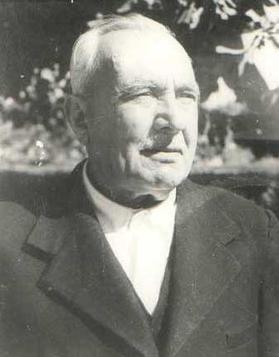
Khan Abdul Jabbar Khan, popularly known as Dr. Khan Sahib, was a pioneer in the Indian Independence Movement and later, a Pakistani politician. He was the elder brother of the Pashtun activist Abdul Ghaffar Khan, both of whom opposed the partition of India. Upon independence, he pledged his allegiance to Pakistan and later served as the First Chief Minister of West Pakistan.

Muhamad Yusuf Khan Khattak was a Pakistani politician, left-wing intellectual, lawyer, and noted Pakistan Movement activist from Khyber Pakhtunkhwa.
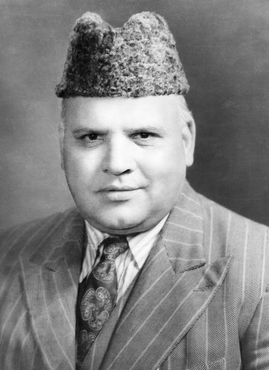
Khan Abdul Qayyum Khan Kashmiri was a major figure in British Indian and later Pakistan politics, in particular in the North-West Frontier Province, where served as the deputy speaker of the provincial assembly, first Chief Minister of North-West Frontier Province and served as Interior Minister of Pakistan in the central government from 1972 to 1977.

General elections were held in Pakistan on 7 December 1970 to elect members of the National Assembly. They were the first direct general elections since the independence of Pakistan and ultimately the only ones held prior to the independence of Bangladesh. Voting took place in 300 general constituencies, of which 162 were in East Pakistan and 138 in West Pakistan. A further thirteen seats were reserved for women, who were to be elected by members of the National Assembly.
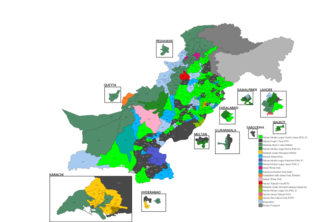
General elections were held in Pakistan on 10 October 2002 to elect the 12th National Assembly and four Provincial Assemblies. The elections were held under the military government of Pervez Musharraf. The two mainstream parties, Pakistan Peoples Party (PPP) and Pakistan Muslim League (N) (PML-N) had several restrictions imposed on them and their leaders Benazir Bhutto and Nawaz Sharif were in exile. In order to address the restrictions, PPP created the Pakistan Peoples Party Parliamentarians (PPPP) under the leadership of Ameen Faheem, to contest the elections on its behalf. The PML-N meanwhile, suffering from the party's division into two factions: one that remained loyal to Sharif and were contesting the elections under the leadership of Javed Hashmi, and the other which had broken away to form the pro-Musharraf Pakistan Muslim League (Q) (PML-Q) under the leadership of Mian Muhammad Azhar. The emergence of the PML-Q marked the beginning of multi-party politics in the country, bringing an end to the decade-long two-party system between the PPP and PML-N.
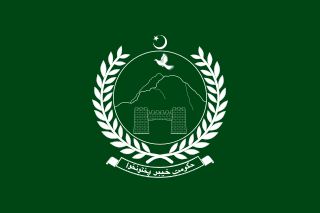
The Provincial Assembly ofKhyber Pakhtunkhwa is a unicameral legislature of elected representatives of the Pakistani province of Khyber Pakhtunkhwa, which is located in Peshawar, the provincial capital. It was established under Article 106 of the Constitution of Pakistan, having a total of 145 seats, with 115 general seats, 26 seats reserved for women and 4 reserved for non-Muslims.
The Legal Framework Order, 1970 (LFO) was a presidential decree issued by then-President of Pakistan Gen. Agha Muhammad Yahya Khan that laid down the political principles and laws governing the 1970 general election, which was the first direct election in the history of Pakistan. The LFO also dissolved the "One Unit" of West Pakistan, re-establishing the four provinces of Punjab, Sindh, Balochistan and the North-West Frontier Province. Pakistan would be a democratic country and the complete name of the country would be the Islamic Republic of Pakistan.
The Pakistan Muslim League (Qayyum), also referred as Qayyum Muslim League (QML) or Muslim League (Qayyum) was a Pakistani political party. After an attempt to neutralize the Pakistan Peoples Party and the Awami League by uniting the PML-Convention and PML-Council, instead, PML-Council leader Sardar Qayyum quit the party and formed his own faction, "Qayyum Muslim League (QML)".

The 1969 East Pakistan uprising was a democratic political uprising in East Pakistan. It was led by the students backed by various political parties such as the Awami League and National Awami Party and specially their student wings against Muhammad Ayub Khan, the president of Pakistan in protest of the military rule, political repressions, Agartala Conspiracy Case and the incarceration of Sheikh Mujibur Rahman and other Bengali nationalists.

Provincial elections were held in British India in the winter of 1936–37 as mandated by the Government of India Act 1935. Elections were held in eleven provinces - Madras, Central Provinces, Bihar, Orissa, the United Provinces, the Bombay Presidency, Assam, the North-West Frontier Province, Bengal, Punjab and Sind.

Provincial elections were held in British India in January 1946 to elect members of the legislative councils of the Indian provinces. The consummation of British rule in India were the 1945/1946 elections. As minor political parties were eliminated, the political scene became restricted to the Indian National Congress and the Muslim League who were more antagonised than ever. The Congress, in a repeat of the 1937 elections, won 90 percent of the general non-Muslim seats while the Muslim League won the majority of Muslim seats (87%) in the provinces. Nevertheless, the All India Muslim League verified its claim to be the sole representative of Muslim India. The election laid the path to Pakistan.
Legislative elections were held in East Bengal between 8 and 12 March 1954, the first since Pakistan became an independent country in 1947. The opposition United Front led by the Awami League and Krishak Sramik Party won a landslide victory with 223 of the 309 seats. The Muslim League Chief Minister of East Pakistan Nurul Amin was defeated in his own constituency by Khaleque Nawaz Khan by over 7,000 votes, with all the Muslim League ministers losing their seats.
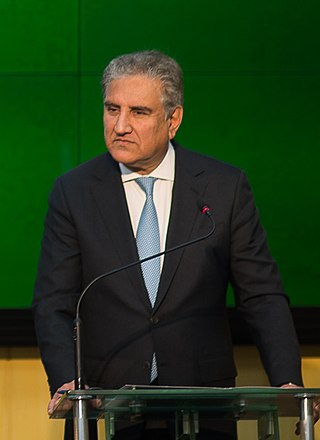
Provincial elections were held in the Pakistani province of Punjab on to elect the members of the 17th Provincial Assembly of the Punjab on 25 July 2018, alongside nationwide general elections and three other provincial elections in Sindh, Balochistan and Khyber Pakhtunkhwa. The remaining two territories of Pakistan, AJK and Gilgit-Baltistan, were ineligible to vote due to their disputed status.

Provincial elections were held in the Pakistani province of Punjab to elect the 15th Provincial Assembly of the Punjab on 18 February 2008, alongside nationwide general elections and three other provincial elections in Sindh, Balochistan and North-West Frontier Province. The remaining two territories of Pakistan, AJK and Gilgit-Baltistan, were ineligible to vote due to their disputed status.

Provincial elections were held in the North-West Frontier Province to elect the members of the 9th Provincial Assembly of North-West Frontier Province on 18 February 2008, alongside nationwide general elections and three other provincial elections in Sindh, Balochistan, and Punjab. The remaining two territories of Pakistan, AJK and Gilgit-Baltistan, were ineligible to vote due to their disputed status. These were the last elections held under the provincial name "North-West Frontier Province", later changed to Khyber Pakhtunkhwa following the Eighteenth Amendment to the Constitution of Pakistan.
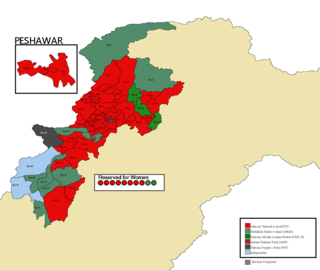
General elections were held in Khyber Pakhtunkhwa on Wednesday, 25 July 2018 to elect the 51 members of 15th National Assembly from Khyber Pakhtunkhwa. The Pakistan Tehreek-e-Insaf (PTI) obtained a landslide victory in the province by winning 37 general seats and increased their margin of victory from 2013. The PTI also won 8 out of 10 reserved seats while the Pakistan Muslim League (N) (PML-N) and Muttahida Majlis-e-Amal (MMA) won 1 reserved seat each.
Sardar Asad Ullah Jan Khan was a Pakistani Pakhtun politician from Kulachi, who represented North-West Frontier Province in the Constituent Assembly of Pakistan. Chieftain of the Gandapur tribal segment, Khan commanded influence in the society; besides, he was a local land magnate.

General Elections were held in Balochistan on Monday 7 December 1970 to elect 5 Members of the 5th National Assembly of Pakistan. Out of 5 National Assembly seats 4 were General seats and 1 was reserved for women.

Provincial elections were held in Balochistan on 8 February 2024 to elect a new provincial legislature. On 5 August 2023, after the approval of the results of the 2023 digital census by the Council of Common Interests headed by Prime Minister Shehbaz Sharif, elections have been delayed for several months, as new delimitations will be published on 14 December 2023. On 2 November 2023, the Election Commission of Pakistan announced, in agreement with the President of Pakistan, Arif Alvi, that the elections will be held on 8 February 2024. This election will be held concurrently with nationwide general elections and other provincial elections.
















